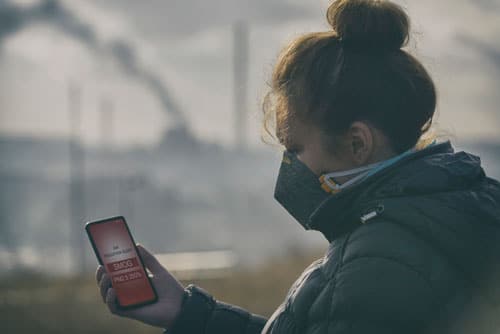Even if you’ve never lit a cigarette in your life, your lungs may be as badly damaged as someone who has smoked a pack a day for 29 years.
That’s the chilling finding of a new study that analyzed the long-term effects of breathing the polluted air of six major U.S. cities.
Researchers looked at more than 7,000 people from 2000 to 2018. They published the results in the Journal of the American Medical Association.
The study showed an increase in emphysema linked to long-term pollution exposure, especially ozone.[1]
Emphysema is a chronic lung disease. It’s one of the main types of chronic obstructive pulmonary disease (COPD). It happens when the tiny air sacs in your lungs are damaged irreparably.
COPD is the third leading cause of death in the U.S.[2]
Dr. Joel Kaufman was the study’s senior co-author. He said he and his colleagues were surprised to see the strength of “air pollution’s impact on the progression of emphysema on lung scans.” It was “in the same league as the effects of cigarette smoking.” That’s by far the best-known cause of emphysema.
The study examined the effects of air pollution in six cities: New York, Chicago, Los Angeles, Baltimore, St. Paul, and Winston-Salem. But the researchers noted that many other areas in the U.S. have air that just as polluted as these cities.
Dr. Kaufman said that chronic lung disease is becoming more common among American non-smokers. Air pollution, he said, might be the reason.”[3]
An earlier study found that air pollution cuts short more than 100,000 American lives a year.[4]
4 Ways to Protect Yourself from Air Pollution
Here’s how you can cut your risk of disease due to air pollution…
- Get a HEPA filter. The most convenient way to clean the air in your home is to add a HEPA filter system to your furnace and/or air conditioning system. HEPA stands for “high efficiency particulate air.” They capture ultrafine particles, including just about all air pollutants.[5]
You can also buy stand-alone filters, which are less costly than whole-house systems.
- Don’t light wood fires. As pleasant as a brightly burning fireplace may seem in the winter, the smoke produces microscopic pollution particles that are damaging when absorbed into your lungs.
- Don’t exercise near busy streets. If you jog or cycle stick to nature trails, parks, and other areas well away from car exhaust.
- Switch to electric lawn-care equipment. Small gas engines in mowers, trimmers, and chainsaws expose the user to heavy doses of pollutants. New electric versions often do the job just as well while being emission-free.
Most of us do not have the power to make our air cleaner. But we can take steps to protect our lungs from pollution.
Editor’s Note: Discover the most effective natural methods to protect and improve your health. Read Independent Healing. It’s your best source for unbiased, evidence-based health information you won’t find anywhere else.
Related Articles
It’s in the Air…and It Gives You Dementia
This Vitamin Protects You from Polluted Air, Study Finds
Top 10 Best Houseplants for Purifying Indoor Air
Like this Article? Forward this article here or Share on Facebook.
[1]https://www.ncbi.nlm.nih.gov/pubmed/31408135
[2]https://www.webmd.com/lung/copd/what-is-emphysema#1
[3]https://www.eurekalert.org/pub_releases/2019-08/uow-apc080819.php
[4] https://www.stateofglobalair.org/data/#/health/plot
[5]https://www.consumerreports.org/cro/air-purifiers/buying-guide

